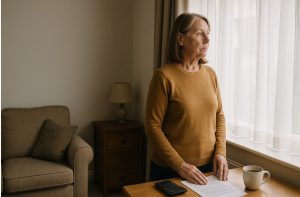Table of Contents
ToggleWhat happens if a pensioner owns their home but still needs financial help from the government? Will they still be eligible for the same level of support, or are their property assets now a deciding factor?
These are pressing questions for thousands of pensioners across the UK following news that the Department for Work and Pensions (DWP) is considering reforms related to property ownership.
While many of the reported changes are not yet confirmed, they reflect a broader conversation within government about making the benefit system more equitable particularly as more pensioners own homes with significant equity.
Understanding how these possible rule changes, along with confirmed benefit updates for 2025 and beyond, affect housing-related support is now essential for both current and future retirees.
What Might Change in the DWP’s Home Ownership Rules for Pensioners?

Under current regulations, a pensioner’s main home is usually not included in means-tested benefit calculations. This means owning a house has little effect on eligibility for Pension Credit, Housing Benefit, or other financial support unless the pensioner owns additional properties or has significant savings.
However, under proposed DWP revisions, this exemption could be reassessed. Both primary and secondary residences may be subject to stricter evaluations. While still under discussion, the rationale is rooted in perceived imbalances: pensioners with high-value properties particularly in London and the South East are sometimes awarded the same support as those with no substantial assets.
These proposals signal a shift towards viewing property equity as part of a pensioner’s wealth, which could, in turn, impact eligibility for financial assistance.
Why Is the DWP Looking to Reform Pensioner Property Assessments?
The DWP’s potential reforms stem from the rising levels of housing wealth held by older UK citizens. As property values continue to climb, especially in certain regions, the government is reevaluating how to allocate resources fairly.
Pensioners who have paid off their mortgages often possess hundreds of thousands of pounds in housing equity, yet still qualify for the same state support as someone renting or living in lower-value housing. This disparity has prompted debate around whether the benefits system should continue to treat all pensioners the same, regardless of home ownership status.
The goal, according to government sources, is to ensure more targeted and need-based benefit distribution. By including certain property values in means-testing, the DWP hopes to reserve financial assistance for those without other forms of support.
How Is Home Ownership Currently Treated in Pension Credit Applications?
As it stands, the rules governing Pension Credit are relatively straightforward when it comes to home ownership. A pensioner’s main residence is typically disregarded in asset assessments. This allows many homeowners to receive the benefit, as long as their income and savings fall below the threshold.
However, complications arise when the individual owns:
- A second property
- A property that is rented out
- Property that has been inherited but not yet sold
In such cases, the market value of the property may be counted as capital, and this could reduce or eliminate a pensioner’s entitlement.
For Pension Credit, capital over £10,000 is considered, and each £500 over that amount is treated as £1 of weekly income.
Could Support for Mortgage Interest Become Harder to Access?

Pensioners with outstanding mortgage debt may turn to Support for Mortgage Interest (SMI) a loan offered by the DWP to help cover mortgage interest payments or loans for necessary home improvements.
But SMI is not a grant. It must be repaid with interest, either when the property is sold or after the claimant passes away. As a result, some pensioners are cautious about relying on it, especially if they wish to leave the home to heirs.
SMI does not pay for capital repayment or full mortgage payments. Instead, it covers only the interest portion of a mortgage, and usually at a standard rate set by the government. This means recipients may still need to make monthly payments on their own.
Due to its loan-based nature, and the possibility of equity being considered for means-tested benefits in the future, SMI may become a more limited tool for pensioners depending on the eventual policy updates.
What Do Universal Credit Changes Mean for Mixed-Age Pensioner Couples?
The rollout of Universal Credit (UC) has replaced many legacy benefits such as Income Support and income-based ESA for working-age claimants. While pensioners who have reached State Pension age are mostly unaffected, there is an exception: mixed-age couples.
If one partner is over State Pension age and the other is under, they cannot claim Pension Credit as a couple. Instead, they must apply for Universal Credit, which often provides lower financial support.
It’s also important to note:
- Those still receiving income-related ESA will be required to transition to Universal Credit by the end of 2025
- Anyone who receives a migration notice must act promptly, or risk losing their current benefits
Pensioners in mixed-age relationships should seek professional advice before making any benefit transitions, as moving to Universal Credit voluntarily could result in lower entitlements.
Are There Other DWP Updates Affecting Pensioner Benefits?
In addition to the proposed home ownership rules, several confirmed updates have been made that directly impact pensioners:
Pension Credit and Housing Benefit Integration
By 2026, the DWP plans to combine Housing Benefit with Pension Credit, streamlining the benefit system for those of retirement age. This change may also come with updated rules regarding assets and property assessments.
Bereavement Support Payment Expansion
As of February 2023, the Bereavement Support Payment (BSP) is no longer limited to married or civil partners. Those who were living with a partner and have dependent children may now claim BSP. Claims can be backdated for deaths that occurred before the policy change.
Disability Benefits Adjustments
- New claimants must now apply for Personal Independence Payment (PIP) instead of Disability Living Allowance (DLA)
- If you were under 65 on 8 April 2013, you’ll eventually be reassessed for PIP
- Those over that age will continue receiving DLA as long as eligibility remains
Does the Benefit Cap Apply to Pensioners?

Generally, the Benefit Cap does not affect those over State Pension age. However, it can apply if a pensioner lives with a partner who is below that age and receiving income-based benefits like Universal Credit.
The cap varies by location and household composition:
| Region | Couples / Single with Child | Single without Children |
| Greater London | £25,323 | £16,967 |
| Rest of the UK | £22,020 | £14,753 |
Pensioners are exempt if they receive:
- Attendance Allowance
- Carer’s Allowance
- Disability Living Allowance (DLA)
- Personal Independence Payment (PIP)
- ESA (Support Group)
- War Widow(er)’s Pension
Understanding these caps is critical for those in mixed-age households where one partner is not yet eligible for Pension Credit.
How Should Pensioners Plan for These Changes?
With both proposed and confirmed changes affecting the structure of DWP support, pensioners must stay proactive. Owning a home may no longer be a neutral factor in benefit eligibility if these rules come into effect.
Key actions include:
- Reviewing all sources of income and capital, including property
- Checking for eligibility through a benefits calculator
- Seeking guidance from welfare advisors or legal professionals
- Avoiding voluntary transitions to Universal Credit without advice
- Preparing for a possible shift in how property equity is treated
Frequently Asked Questions
Do pensioners lose Pension Credit if they own their home?
No, owning your home does not automatically disqualify you from Pension Credit. However, if you own multiple properties or have high equity, future changes could impact eligibility.
Can second properties reduce benefit entitlements?
Yes. Second homes or rental properties are considered assets and may affect means-tested benefits like Housing Benefit or Pension Credit.
How will Pension Credit and Housing Benefit integration affect me?
The 2026 integration may simplify the application process but could also lead to reassessments of existing claims, particularly involving property and savings.
Will Support for Mortgage Interest help cover my mortgage fully?
No, it only covers the interest portion. It is also a loan that must be repaid upon selling the property or passing away.
Do mixed-age couples lose more benefits than same-age couples?
Potentially yes. Mixed-age couples must claim Universal Credit instead of Pension Credit, which often results in lower overall support.
Does equity release affect my entitlement?
Yes. Funds received through equity release may be considered capital and can reduce or eliminate eligibility for certain means-tested benefits.
What happens if I inherit a house while on benefits?
Inherited property could be considered part of your capital and might affect your entitlement, depending on whether the property is sold, lived in, or rented out.




